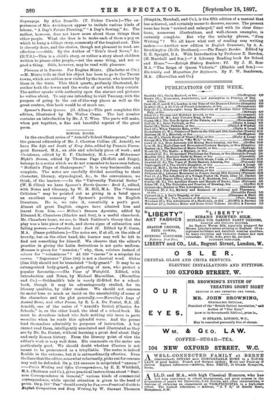SCHOOL BOOKS.
In the excellent series of "Arnold's School Shakespeare," under the general editorship of Mr. J. Churton Collins (E. Arnold), we have The Life and Death of King John, edited by Francis Pierre- pont Barnard, M.A., an able and scholarly piece of work ; and Coriolanus, edited by R. F. Cholmeley, M.A.—A Midsummer Night's Dream, edited by Thomas Page (Moffatt and Paige), belongs to a series which we do not remember to have seen before, " Moffatt's Plays of Shakespeare." It is very businesslike and complete. The notes are carefully divided according to their character, literary, etymological, &c., to the convenience, we think, of the learner.—In the "University Tutorial Series" (W. B. Clive) we have Spenser's Faerie Queens: Book I., edited, with Notes and Glossary, by W. H. Hill, M.A. The "General Criticism" may be pointed out as giving in a brief space an excellent summary of Spenser's position in English literature. He is, we take it, essentially a poet's poet. Almost all great English singers have admired him and learnt from him. — Milton's Samson Agonistes, edited by Edmund K. Chambers (Blaekie and Son), is a useful class-book. Mr. Chambers leans, we see, to Mark Pattison's theory that the play was a late piece of work, and shows signs of exhaustion and failing powers.—Paradise Lost : Book II. Edited by F. Gorse, MA. (Same publishers.)—The notes err, if at all, on the side of brevity, but on the other hand, the learner may well be left to find out something for himself. We observe that the editor's practice in giving the Latin derivations is not quite uniform. Mansum is given for " mansion; " why, then, vo/utum instead of volvere for " voluminous " ? At 930 " carrus " is a misprint for curs-us. " Superanns" (line 244) is not a classical word. Globus (line 512) should not be translated "body-guard." It may be an extemporised body-guard, a gathering of men, who protect a popular favourite.—The Vicar of Wakefield. Edited, with Introduction and Notes, by Michael Macmillan. (Macmillan and Co.) —Goldsmith's tale is surely ill-fitted for a school- book, though it may be advantageously studied, for its literary qualities, by older readers. We should not censure its moral tone so much as insist on the unsuitability of some of the characters and the plot generally.—Macaulay's Lays of Ancient Rome, and other Poems, by R. L. A. Du Pontet, BA. (E. Arnold), one of the series of "Arnold's British !Classics for Schools," is, on the other hand, the ideal of a school-book. He must be Arcadicus indeed who feels nothing stir /aeva in pane mamillae when he reads this splendid verse. And the poems lend themselves admirably to purposes of instruction. A boy cannot read them, intelligently annotated and illustrated as they are by Mr. Du Pontet, without learning a great deal about Italy and early Roman history. From the literary point of view the editor's work is very well done. His comments on the metre are particularly good. We should doubt whether Clusium is not meant to be pronounced as a trisyllable. The metre is indeed flexible in the extreme, but it is extraordinarily effective. Even the lines that the editor, somewhat reluctantly, picks out for censure may well be defended. On p. 124 annuum is misprinted "annum." —Precis Writing and Office Correspondence, by E. E. Whitfield, M.A. (Methuen and Co.), gives practical instructions about " Busi- ness Correspondence in General," various kinds of commercial correspondence, while special attention is given to the head of precis. On p. 116 "Pan" should surely be Pax.—Practical Guide to English Composition and Easy Writing,by W. Stewart Thomson (Simpkin, Marshall, and Co.), is the fifth edition of a manual that has achieved, and certainly seems to deserve, success. The present issue has been "revised and enlarged," and with its clear direc- tions, numerous illustrations, and well-chosen examples, is certainly complete. But why the unlucky phrase, "Easy Writing " ? We all know what sort of reading easy writing makes.—Another new edition is English Grammar, by A. A. Brockington (Belle Brothers).--The Temple Reader. Edited by E. E. Speight, B.A. With Introduction by Professor E. Dowden, (H. Marshall and Son.)—" A Literary Reading book for School and Home."—Raleigh History Readers : VI. By T. H. Rev M.A. "The Reign of Queen Victoria." (Blackie and Son.)— Electricity and Magnetism for Beginners. By F. W. Sanderson, M.A. (Macmillan and Co.)


































 Previous page
Previous page